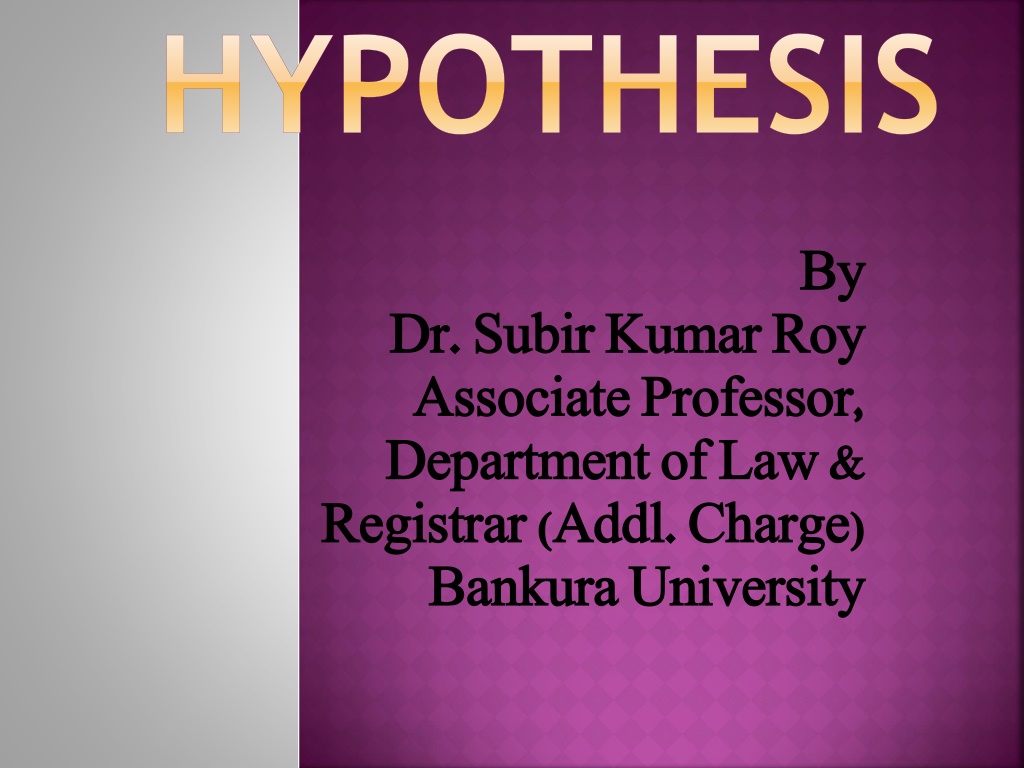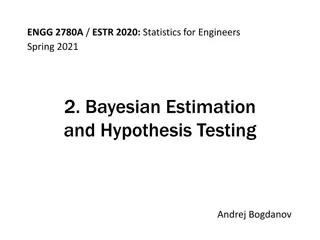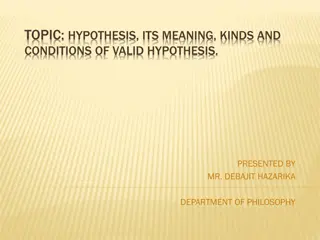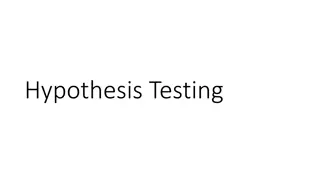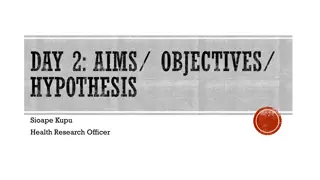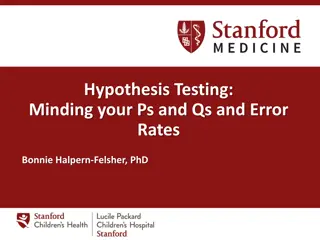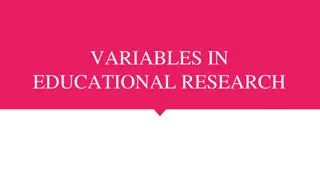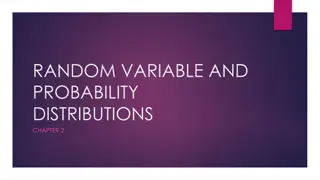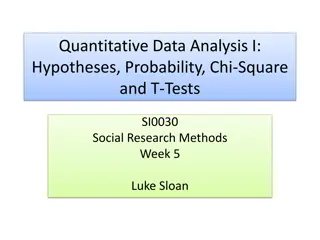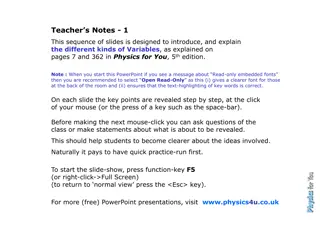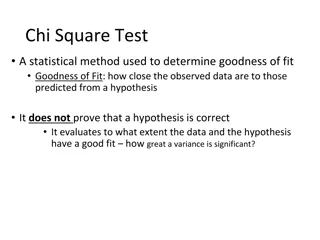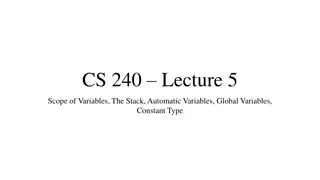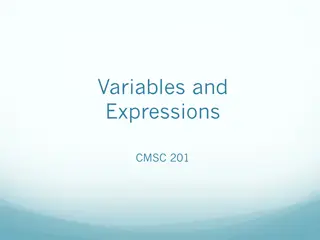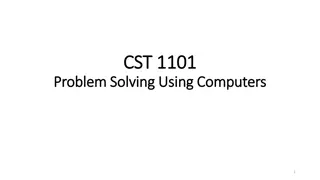Understanding Research Hypothesis and Variables in Academic Studies
Research hypothesis plays a crucial role in academic research by providing a probable solution to a research problem. It establishes relationships between different variables, which are empirical properties that can vary. Variables can be independent, dependent, confounding, or intervening, influencing the outcome of a study. By defining and testing hypotheses, researchers can draw conclusions and make predictions based on collected data.
Download Presentation

Please find below an Image/Link to download the presentation.
The content on the website is provided AS IS for your information and personal use only. It may not be sold, licensed, or shared on other websites without obtaining consent from the author. Download presentation by click this link. If you encounter any issues during the download, it is possible that the publisher has removed the file from their server.
E N D
Presentation Transcript
HYPOTHESIS By By Dr. Subir Kumar Roy Dr. Subir Kumar Roy Associate Professor, Associate Professor, Department of Law & Department of Law & Registrar (Addl. Charge) Registrar (Addl. Charge) Bankura University Bankura University
Hypothesis has a very important place in research.Hypothesis is probable or tentative answer to research problem or research question. It is a kind of suggested explanation or solution of the problem which may not be proved always correct. It basically establishes a relationship in between two or more variables related to the subject matter of the research.
It can be defined as a statement of generalization, which is probable or possibly but needs to be tested through field studies or survey. AKINDELE AND OLAOPA (1997 : 29) argued that: Research problem in itself, cannot be scientifically solved until it has been reduced into hypothesis that shows a casual relationship or relationships between dependent and independent variables. (Mr. O. J. Jejelola, LEGAL RESEARCH: AN OVERVIEW OF A RESEARCH PROPOSAL, European Scientific Journal September 2014 /SPECIAL/ edition Vol.2 ISSN: 1857 7881 (Print) e - ISSN 1857- 7431) The research hypothesis is also termed as predictive statement and acts as a bridge in between independent and dependent variable
The variables are empirical properties that take two or more values . In other words a variable is an entity that can take on different values. In simple terms, anything that can vary or that is not constant can be considered a variable. Variables actually exposes the variations involved in a concept. It must be measurable and related to the concept. Variables are factors or qualities the researcher wants to study and draw conclusions about. So variable means which varies and the opposite of it is constant. For example in a study of dealing with the differences in between males and females gender would be variable. Variables can be independent, dependent, confounding or intervening variables. The independent variable is the cause of the dependent variable the effect. For example in a case involving examination malpractice by students of any educational institutions, the independent variable may be indiscipline while the dependent variable can be attitude of the invigilators during examinations.
An Another Example If, intelligence students academic then a measure of intelligence such as an IQ score is an independent variable, while a measure of academic success such as grade point average is a dependent variable. Here the effort of the students can be a significant factor to affect the academic score which can be termed as intervening variable. Again, influences qualifications,
Dependent variable is the consequences or outcome of the manipulation of independent variables. The confounding variables are differences between groups other than the independent variables.
Hypothesis is a kind of prediction among the variables lying with the research problem which may be proved right or wrong or will be accepted or rejected with reference to the adduced facts. The hypothesis should be formulated in clear terms and should be ascertained unambiguously. A hypothesis can be defined as a tentative explanation of the research problem, a possible outcome of the research, or an educated guess about the research outcome. Goode and Hatt have defined it as a proposition which can be put to test to determine its validity .
Nature of Hypothesis: The hypothesis is a clear statement of what is intended to be investigated. It should be specified before research is conducted and openly stated in reporting the results. Nature of Hypothesis: Solve a problem scientifically It is a powerful tool of advancement of existing knowledge and conducive to further enquiry. It can be tested either can be verified or falsified. Hypotheses are not moral or ethical questions. It is neither too specific nor too general. It is a prediction of consequences. It is considered valuable even if proven false.
A simple research hypothesis predicts the relationship between a single independent variable and a single dependent variable. A Complex hypothesis predicts the relationship between two or more independent variables and two or more dependent variables. Hypothesis can be classified as Descriptive Hypothesis, Associational Hypothesis, Causal Hypothesis. Descriptive Hypothesis analyses about the characteristics of an individual, event, entity etc. Associational Hypothesis indicates the relationship between two variables such as religious belief and sanction of marriage or relationship in between ecological factor and criminality. Highest order of hypothesis is called the causal hypothesis which indicates that one event is the cause of another event such as childhood experience determine the nature of adulthood personality.
The null hypothesis is a statement which the researcher wants to test. It is a statistical hypothesis, tested for its possible rejection under the expectation of its being true. In general, the null hypothesis is that things are the same as each other, or the same as a theoretical expectation. The alternative hypothesis is that things are different from each other, or different from a theoretical expectation. Null Hypothesis is denoted as Ho and Alternative Hypothesis as HI. A null hypothesis negates the relationship in between variables such as illiteracy has nothing to do with crime or illiteracy and poverty has no relationship
Formulation of Hypothesis: Background knowledge is essential for perceiving relationships among the variables and to findings other researchers have reported on the problem under study. New knowledge, new discoveries and new inventions should always form continuity with the already existing corpus of knowledge and therefore it becomes all the more essential to be well versed with the already existing knowledge. determine what
When the prediction about any research problem is tested by scientific methods, it is termed as research hypothesis. The research hypothesis is a probable analysis that relates an independent variable to a dependent variable. Usually a research hypothesis should contain, independent and one dependent variable. Predictive statements which are not to be objectively verified or the relationships that are assumed but not to be tested, are not termed research hypotheses. (C.R. Kothari, Research Methodology, Methods & Techniques, new age International (P) Limited, Publishers) at least, one
Research in which the independent variable is manipulated is termed experimental hypothesis-testing research and a research in which an independent variable is not manipulated is called non-experimental hypothesis-testing research . For instance, suppose a researcher wants to study the co-relation in between reading ability and intelligence and for that purpose randomly select s50 students, is the example of non-experimental hypothesis-testing research . And when such group has been equally divided by the researchers in two group: A and B and one is assigned with usual studies programme and another is special studies programme and at the end of the training the researcher wanted to judge the impact of such training on their performance level . This experiment is termed as experimental hypothesis-testing research because in the above matter the independent variable i.e. Training programme is manipulated. (C.R. Kothari, Research Methodology, Methods & Techniques, new age International (P) Limited, Publishers)
Characteristics of Hypothesis: Hypothesis should be simple so that it is easily understood by everyone. ii) Hypothesis should be clear, specific and precise. If the hypothesis is not clear and precise, the inferences drawn on its basis cannot be taken as reliable. ii) Hypothesis should be capable of being tested. iii) Hypothesis should state relationship between variables. iv) Hypothesis should be consistent with most known facts. i.e. it must be consistent with a substantial body of established facts. v) The hypothesis must explain the facts that gave rise to the need for explanation. It must actually explain what it claims to explain.
References: C.R. Kothari, Research Methodology, Methods & Techniques, new age International (P) Limited, Publishers, New Delhi Mr. O. J. Jejelola, LEGAL RESEARCH: AN OVERVIEW OF A RESEARCH PROPOSAL, European Scientific Journal September 2014 /SPECIAL/ edition Vol.2 ISSN: 1857 7881 (Print) e - ISSN 1857- 7431 Bhattacherjee, Anol, "Social Science Research: Principles, Methods, and Practices" (2012). Textbooks Collection. Book 3. http://scholarcommons.usf.edu/oa_textbooks/3 \https://epgp.inflibnet.ac.in/ Dr. Chattopadhyay & Dr. Sen, (2013), Levant Books, Kolkata Rattan Singh, (2016) ,Legal Research Methodology, Lexis Nexis
